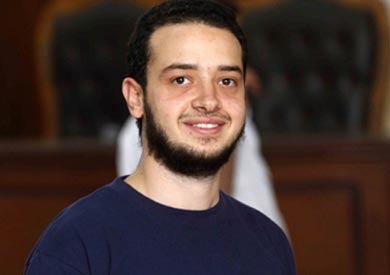Anas al-Beltagy has been arbitrarily detained for over nine years solely due to his family links. He is being held in incommunicado in the Badr Prison Complex, some 70 km east of Cairo. Anas al-Beltagy is at risk of torture and other ill-treatment and has been denied any visits and other contact with his family for over six years.
Since his arrest in December 2013, Egyptian authorities have subjected Anas al-Beltagy to a litany of violations including enforced disappearance and torture. Concerns for his wellbeing and physical and mental health have mounted in recent weeks amid alarming reports emerging from the Badr Prison Complex about prisoner suicides and hunger strikes in protest at their conditions.
Download the PDF of UA 29/23 below:
How you can help
Write to the Egyptian President urging him to:
- Ensure that Anas al-Beltagy is immediately and unconditionally released and all charges against him are dropped as they are brought solely because of his family links and his exercise of his human rights.
- Pending his release, ensure that he is held in conditions meeting international standards for the treatment of prisoners and granted regular access to his family, lawyers and adequate healthcare.
Write to:
President Abdelfattah al-Sisi
Office of the President
Al Ittihadia Palace, Cairo, Egypt
Email: p.spokesman@op.gov.eg
Twitter: @AlsisiOfficial
Salutation: Your Excellency:
***Please copy the Minister of Interior (center@iscmi.gov.eg or E.HumanRightsSector@moi.gov.eg ) as well as the Presidential pardons committee via the National Council for Human Rights (nchr-n@nchr.org.eg ) in your emails.
Background
Security forces first arrested then-20-year-old Anas al-Beltagy on December 24, 2013 during a visit with his mother to the Tora Prison Complex to see his detained father, Mohamed al-Beltagy. According to information gathered by Amnesty International, security forces surrounded and beat them, before transferring them to the Maadi prosecution where they were interrogated over accusations of assaulting prison guards. The prosecution ordered their provisional release on bail after about twenty hours of detention.
On December 31, 2013, Anas al-Beltagy was arrested at a friend’s house in Nasr City neighborhood of Cairo. He was taken to Nasr City 1 Police Station, where police officers refused to acknowledge his detention and forcibly disappeared him for nearly a month, during which he was subjected to torture and other ill-treatment. Amnesty International learned from informed sources that security forces held him in a small iron cage, described as “unfit for humans”.
After his transfer to Abu Zaabal prison in Alexandria in early 2014, the prison administration held him in prolonged solitary confinement and forced him to sleep on the bare concrete floor. He was subsequently transferred to the Tora Prison Complex, south of Cairo, where he continued to be subjected to torture and other ill-treatment, including prolonged solitary confinement. Her was transferred to the Badr Prison Complex in November 2022.
Disturbing revelations
Since February 2023, concerns about cruel and inhuman detention conditions in the Badr 3 prison have increased amid leaked letters by prisoners indicating a proliferation in suicide attempts by prisoners. These prisoners have been subjected to torture and other ill-treatment, including deliberate denial of healthcare, exposure to extreme cold, camera surveillance around the clock, and bombardment with bright lights 24 hours a day.
Prisoner letters paint a frightening picture of starving detainees held in isolation, whose despair at the injustices suffered for years has led some to attempt suicide and others to go on hunger strike. Concerns were further heightened after some prisoners held in Badr 3 complained during a detention renewal hearing, held online on March 13, 2023, about being stripped naked and beaten.
Since the Badr Prison Complex became operational in mid-2022, the authorities have banned family visits to all prisoners in Badr 3 and some prisoners in Badr 1, including Anas al-Beltagy. Prison officials also ban prisoners from any phone or written communication with their relatives, effectively subjecting them to incommunicado detention.
Given that the detainees are cut off from the outside world, little information is known about their current situation amid concerns for their well-being and mental health and reports of prison authorities subjecting prisoners to punitive measures for complaining about their treatment including by transferring some to unknown locations and placing others in solitary confinement.
Prison officials also refuse to accept deliveries of food, clothes, and other essentials to prisoners from their families, despite well-documented patterns of prison authorities failing to provide those in their custody with sufficient food, potable water, basic items for personal hygiene, adequate clothing and bedding.
Security forces have long targeted the family of Mohamed al-Beltagy, leading several to flee Egypt. Security forces killed Asma al-Beltagy, Anas al-Beltagy’s sister, aged 16, during their violent dispersal of the Rabaa al-Adawiya sit-in on August 14, 2013, which left some 900 dead. No security or military official has been held accountable to date, while authorities rounded up thousands of actual or suspected members and supporters of the Muslim Brotherhood.




























